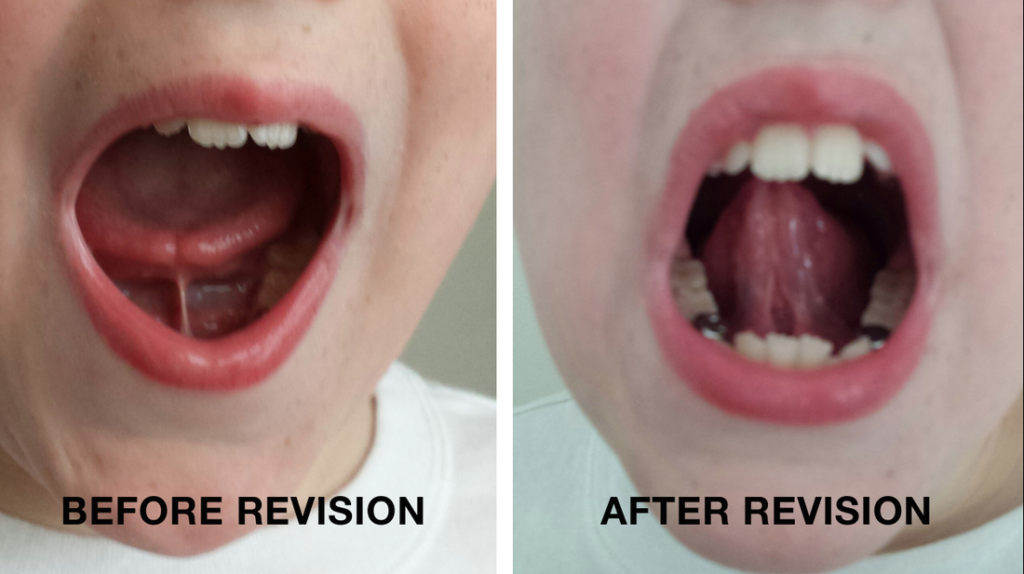Tongue-tie occurs when a string of tissue under the tongue stops the tongue from moving well. Tongue-tie can improve on its own by the age of two or three years. Severe cases of tongue-tie can be treated by cutting the tissue under the tongue (the frenum). This is called a frenectomy.
in the same way Is being tongue tied rare? While the exact prevalence of tongue-tie is unknown, current evidence suggests a 3 percent to 5 percent occurrence, with a range of 0.1 percent to 10 percent, depending on the criteria used to evaluate the frenulum. Some healthcare providers have given anecdotal estimates of up to 25 percent prevalence.
What happens if you don’t cut a tongue-tie? Without treating tongue-tie, it can affect the health of your child through different ages in their life. During infancy, untreated tongue-tie can result in these health consequences: Poor bonding between mother and baby. Sleep deprivation for both mother and baby.
Can tongue-tie grow back? Tongue ties don’t “grow back”, but they may reattach if you aren’t diligent about keeping up with post-surgery exercises.
What age is best for tongue-tie surgery?
Frenuloplasty is the release of the tissue (lingual frenulum) that attaches the tongue to the floor of the mouth and closure of the wound with stitches. It is the preferred surgery for tongue-tie in a child older than 1 year of age.
Beside this Does tongue tie affect kissing?
Tongue-tie can interfere with activities such as licking an ice cream cone, licking the lips, kissing or playing a wind instrument.
Can tongue tie grow back? Tongue ties don’t “grow back”, but they may reattach if you aren’t diligent about keeping up with post-surgery exercises.
Does Tonguetip release hurt? Tongue-tie division involves cutting the short, tight piece of skin connecting the underside of the tongue to the bottom of the mouth. It’s a quick, simple and almost painless procedure that usually improves feeding straight away.
Should I have my babies tongue-tie cut?
Medical experts don’t routinely ‘snip’ a tongue-tie, but the procedure is often recommended to improve breastfeeding.
Can a tongue-tie cause a lisp? Other possible causes of lisps include: Tongue-tie — a condition where the tongue is tethered to the bottom of the mouth. This restricts its movement.
Can a tongue-tie child talk?
Tongue-tie will not affect a child’s ability to learn speech and will not cause speech delay, but it may cause issues with articulation, or the way the words are pronounced.
Are baby in pain after tongue-tie cut? Some pain is normal after the procedure so if your baby is crying more than usual in the first 24 hours don’t worry. Feed them regularly and give them lots of cuddles and skin to skin contact. There are pain relief options as well.
What percentage of tongue ties reattach?
Unfortunately if a tongue tie has re-attached once there is a 50% chance it will re-attach following a repeat procedure. One would also be expected to do deep wound massage during the aftercare to reduce the chance of further re-attachment.
Can you fix a tongue-tie without surgery?
Non-surgical procedures: There are new non-invasive procedures that can be used to help manage the effects of tongue-tie. These non-surgical approaches include lactation interventions to help babies latch on and breastfeed effectively, as well as speech therapy.
Can baby stick tongue out with tongue-tie? With tongue-tie, an unusually short, thick or tight band of tissue (lingual frenulum) tethers the bottom of the tongue’s tip to the floor of the mouth, so it may interfere with breast-feeding. Someone who has tongue-tie might have difficulty sticking out his or her tongue.
Should I get tongue-tie cut? Medical experts don’t routinely ‘snip’ a tongue-tie, but the procedure is often recommended to improve breastfeeding.
What age can you get tongue-tie surgery?
Frenuloplasty is the release of the tissue (lingual frenulum) that attaches the tongue to the floor of the mouth and closure of the wound with stitches. It is the preferred surgery for tongue-tie in a child older than 1 year of age.
What age can you fix tongue-tie? This simple, quick procedure often is done without anesthesia in babies younger than 3 months old because the area has few nerve endings or blood vessels. It’s safe to do this in an outpatient office setting.
Can you talk without a tongue?
But, with a lot of practice, anything is possible. Talking without a tongue is possible. For Cynthia Zamora, simply being able to talk is nothing short of miraculous. Three years ago, doctors found a tumor that covered more than half her tongue.
Do pacifiers help with tongue tie? If you are breastfeeding then it is preferable to avoid using a soother following tongue tie release. Soother use can encourage a chomping or biting movement when using the soother and can impede the transition to a more effective sucking movement.
Why is tongue tie increasing?
Tongue ties are being blamed on social media for a slew of woes affecting infants—from nipple pain to poor napping to speech issues—but many experts agree that the rise in diagnosis and treatment is being led by consumer demand rather than by hard science.
Why are so many babies tongue tied? Tongue and lip ties often occur in tandem. To breastfeed effectively, babies need to create negative pressure (in a word, a vacuum) on the breast. This differs from the compression that some babies with limited tongue mobility use, effectively squeezing the milk out rather than sucking.
Do’t forget to share this post !
